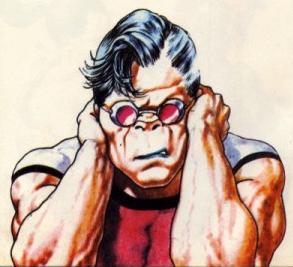The principles guiding Deus Ex: Mankind Divided's level design
Mankind Divided's senior level designer and lead level artist talk about their approach to building worlds.
A couple months ago, I wrote
a feature about level designers and how they approach their work. Despite interviewing designers who work on very different games—open-world shooters, puzzle games, narrative-driven adventures—I found commonalities all throughout their answers. Level designers are fascinating.
Deadlines as they are, though, one interview didn't make it into that feature.
Deus Ex: Mankind Divided senior level designer Julien Hantzi and lead level artist Jean-François Morier answered few questions over email, and though my line of questioning for the feature was general, they share a lot of interesting details about Eidos Montreal's process, and how they approach choice, pacing, and emotion in their levels. It'd be a terrible thing to waste, so I've decided to publish an excerpt from that Q&A on its own, which you can read below.
PC Gamer: What are the most important qualities of a good level?
Julien Hantzi, senior level designer : The most important quality of good level design is the complete symbiosis of the gameplay, art direction, and story. You can have great gameplay, but without all of the elements working well together, it just doesn't work. If a level is extremely fun, but is based on environments that are not grounded in reality, where vistas are not well introduced, or in locations where nothing meaningful happens to the characters, it won't work. It won't be considered immersive, which can take away from fun factor for the player.
Jean-François Morier, lead level artist: When the level is built logically, giving gamers the impression that the challenge is great, but not overly frustrating. It’s also important that all of the different challenges and objectives are fluid and easy to justify. We also really appreciate when a spectacular art installation is placed in an area that both provides the player the time to really enjoy it, and is in an environment that is a natural fit for it.
JH: In a game like Deus Ex, a good level must provide the players with a very balanced experience, where they are free to experiment and choose their play style at any moment. I like to think that a well-designed level will create some kind of collaboration between the designer and the player in a space where experimentation is king. I am getting tired of corridor games where the only breakthrough for the player is to follow a scripted and linear path, making him more a spectator of his own actions than anything else. I much prefer when the player is more of an actor, whose actions give him the right to roleplay, even having consequences within and on the game world. I also appreciate when a level gives the player enough freedom to break the rules, or even operate outside of them.
Let's say, in my objectives, I need to talk to a guy to obtain information... what if I ignore this guy, or make him angry so he won't talk to me? These are all considered viable paths for the player, but I also need to make sure they obtain this information in some other way. Multi-solution, multi-path, and experimentation are really important to make a great level. However, like I said, for the magic to happen, the environment must be credible and visually stunning. The story happening within the level must also be memorable, while being infused in the environment itself (show, don't tell).
JFM: In Deus Ex, most of the alternate paths are difficult to ground in reality (paths on high ceilings, in between walls, grids on the floor, etc), and the level design team is constantly proposing alternate ways to achieve this from a visual perspective. It’s why using real world references is so important. It’s always a good idea to return to what exists in the real world to make sure the environment is credible and grounded.
Are there things you think every level should have? Common principles?
JH: I think it depends on the game you are making, so there is not one single ‘winning’ formula. The level exists to make the most of the game design in a given environment, that's all. If you take a game like Deus Ex, every level should give you the means of expressing yourself as a player, and challenge you in terms of stealth, action, and exploration. On top of this, you should simultaneously have the opportunity to navigate through a grounded and beautiful environment. The level also has to tell a story—about your character, about the world, or both—and push the narrative forward. While respecting the consistency and visual language, every level should also surprise the player in one way or another. It can come from the environment itself, from a small twist in the plot, or through the use of exotic gameplay ingredients.
JFM: So many things are necessary to each level. Of course, each level must be different, and must respect the vision of the game directors. However, a level is a mix of a lot of things. The idea is to always be able to justify what’s in the environment, and who it’s useful for. Visually, you can’t constantly bombard the players with gameplay elements and details. You need to have a pause in the action to allow the players to ‘cool down’ and regroup. So, you must carefully merge gameplay with one or more aesthetically stunning environments, which serve as 'wow' moments. These moments help the player to relax and appreciate the environment that they’re playing in.
Do you have any tricks up your sleeves that help you guide players, or at least keep them from getting lost?
JH: Of course, we have a bag full of tricks! To note, I am not speaking of objective markers, which are the last resort for guiding players, even though it has become a common practice over the past few years. I am talking about lighting, composition, and landmarks of course. However, there are more subtle things like enemy placement, gameplay ingredient placement, etc, that can help as well. Even the way we bend the rules of architecture, all of that is made to make sure players get to their objectives in a natural way ... It is always a challenge to make sure the player doesn't get lost, and it is even more difficult when you are dealing with open levels and nonlinear objectives.
JFM: Yes, I agree with Julien and, like I said, the rules of architecture are very important. If we construct a level like a real building is built, gamers will instinctively take the appropriate path. Of course, the landmarks and indications are necessary, but if the layout is not grounded at its base, it will be really hard for players to orient themselves.
What aspects of your work do you feel go unnoticed, whether by players or critics?
JH: I think that the small details must go unnoticed. If players or critics begin to notice, I think it breaks the immersion. Our job is to make all the small details invisible, so when you do something great, you won't say "that's great level design" but will instead tell yourself, "Man, I'm good!"
But yeah, if there is something I would like to be a bit more recognized for by critics and players, it’s that making a game based on player choice (Do I play stealth or guns blazing, lethal or non-lethal? Do I choose to follow the main path, or try something else?) is extremely challenging to successfully achieve from a level design perspective. It is a very rewarding experience to work on a game as complex as Deus Ex, and it is amazing to see other games embracing this philosophy. However, even if ‘player choice’ is a very common bullet point on the back of the box of a lot of games, very few really deliver on that promise. This is even the case with some open world games, which give the player the freedom to go where they want, but give you only one way to complete a mission.
JFM: For each level, the layout must be architecturally logical. This aspect is essential, because without this, it is easy to get lost. Also, the details in the clutter contained within some levels are very time consuming to make, but it is important when working to infuse the story elements within the environment, which factor into the emotional impact a level has. We know that both the players and the critics likely won’t mention these elements when writing reviews, but we also know that, if we don’t put any energy into them, the overall emotional impact of the level will be negatively affected.
Are there level design elements you see often, but don't like? What should be avoided?
JH: To be honest, there are quite a few. For me, bad visual language and inconsistencies are two of the most frustrating elements I see. When you are not able to play as intended because of how the environment is built, or because the visuals are not connected with the gameplay experience, it makes me want to stop playing. In games where navigation is key, I really dislike when it is not clear if I can reach a certain part of the level or not.
I also don’t like when the same ingredient is present, but is used differently someplace else. Let's say, an object is interactive in a room, but in another room it is no longer interactive. Another example is when I can take cover with a specific object in one level, but I cannot use it for that function in another level. To be honest, it happens all the time, even on maps I work on. Everything tends to come together very quickly, so if you aren’t communicating well with your co-workers, aren’t playing the map enough, or aren’t a great ambassador of the game guidelines, some of these problems may appear in maps without you noticing. However, even when you are extra careful, some may still slip through the cracks!
Another thing I dislike is how some levels can become very predictable by using the same structure again and again, or when the world building involuntarily sells a punch. Let's say you are in game where you’re exploring a quiet, tense environment. There is enough tension to make you ask yourself what will happen next... but all of a sudden, something doesn't look quite right: you are able to
see the level design popping from the environment, making the sequence of events predictable. There are crates everywhere, some structures don't make any sense, and all of a sudden, I become fully aware that there will be a cinematic, I will be ambushed, and there will be a gunfight sequence.
Again, this is tricky: you want your game to be fun, to be really enjoyable for players. So when you need enough cover for your player, it is not always easy to justify them, and making them blend seamlessly within the environment is a great challenge. The true genius of level design is to make these elements invisible, while still making sure the player understands and recognizes the existence of these elements, inspiring them to experiment while they play without sacrificing their level of immersion.
JFM: I agree with Julien. One of most frustrating elements in level design is when we can’t understand the architecture of the layout. We know at this moment that the level will be problematic, and that the team will struggle to find a solution to justify the existence of certain elements within the environment. It’s why we prefer redoing the layout from scratch when there are too many inconsistencies.





































